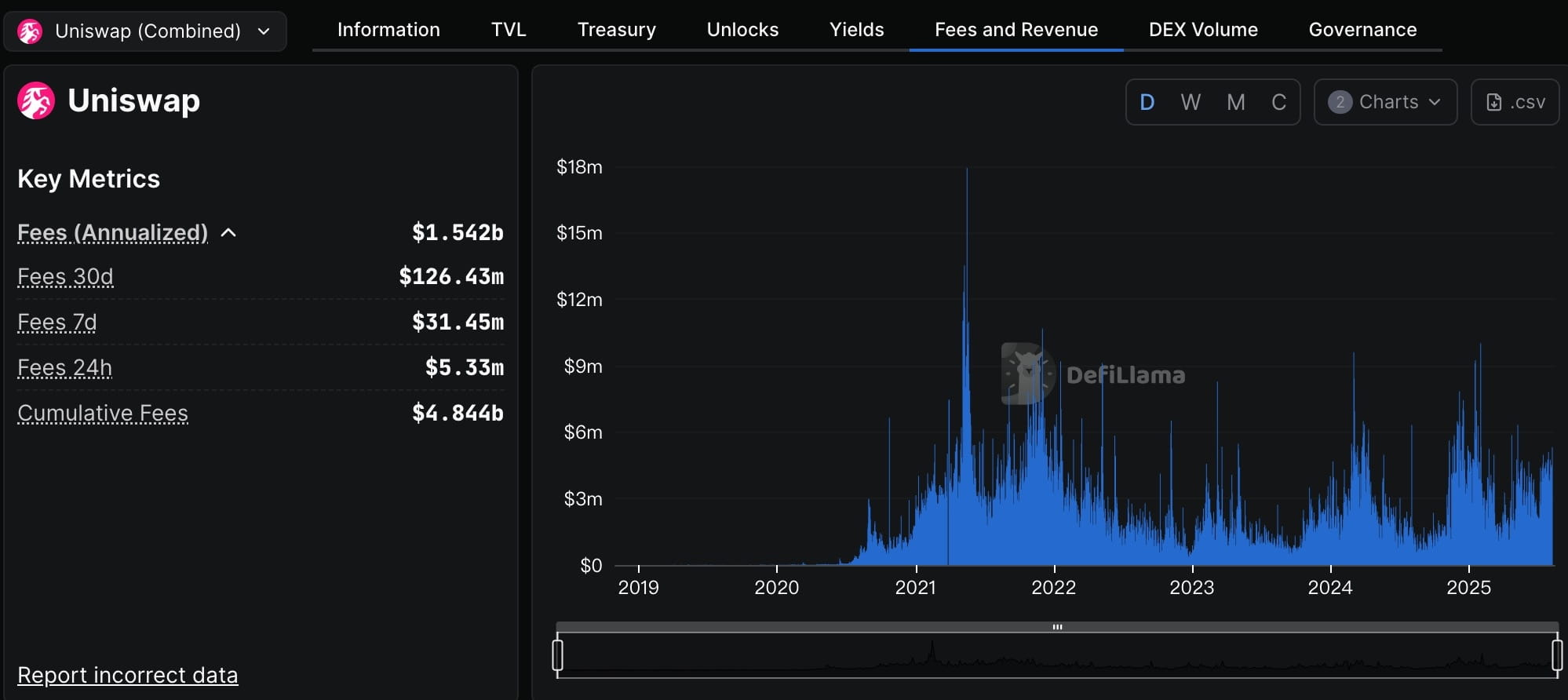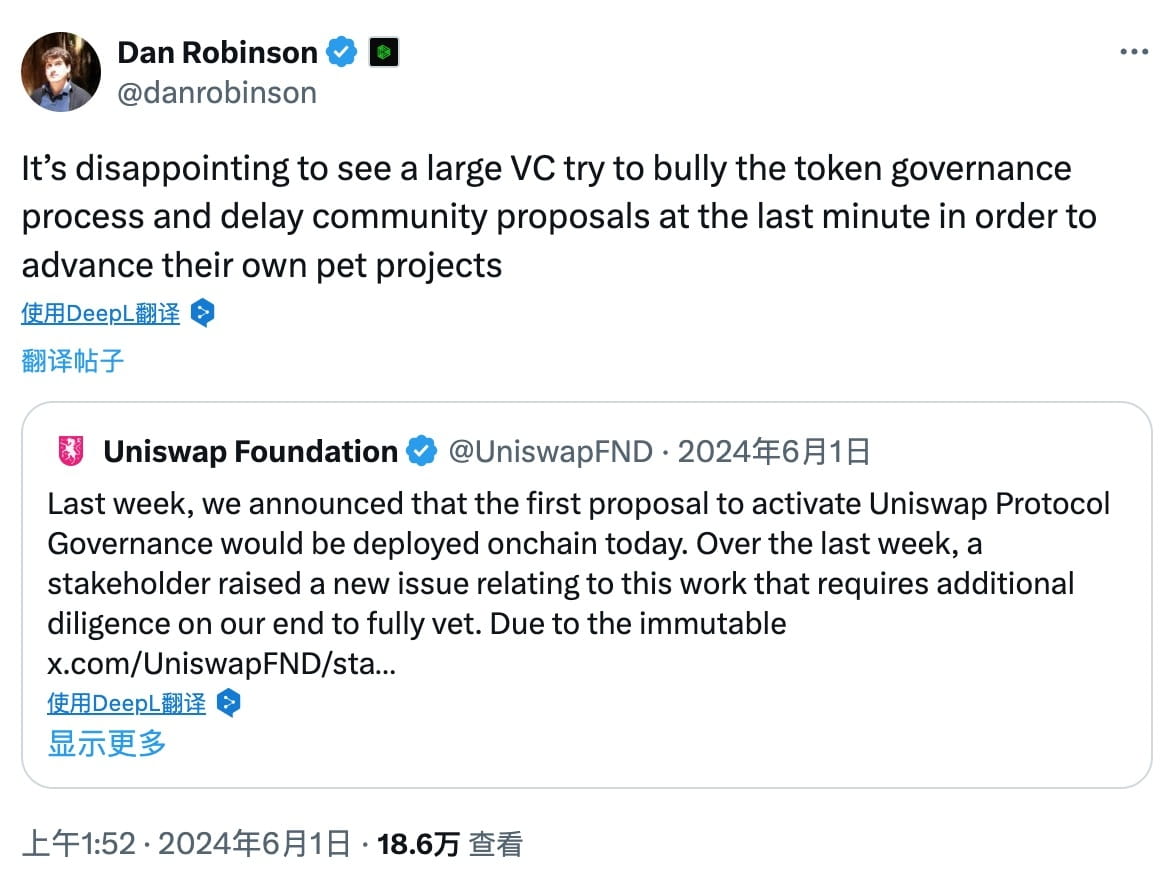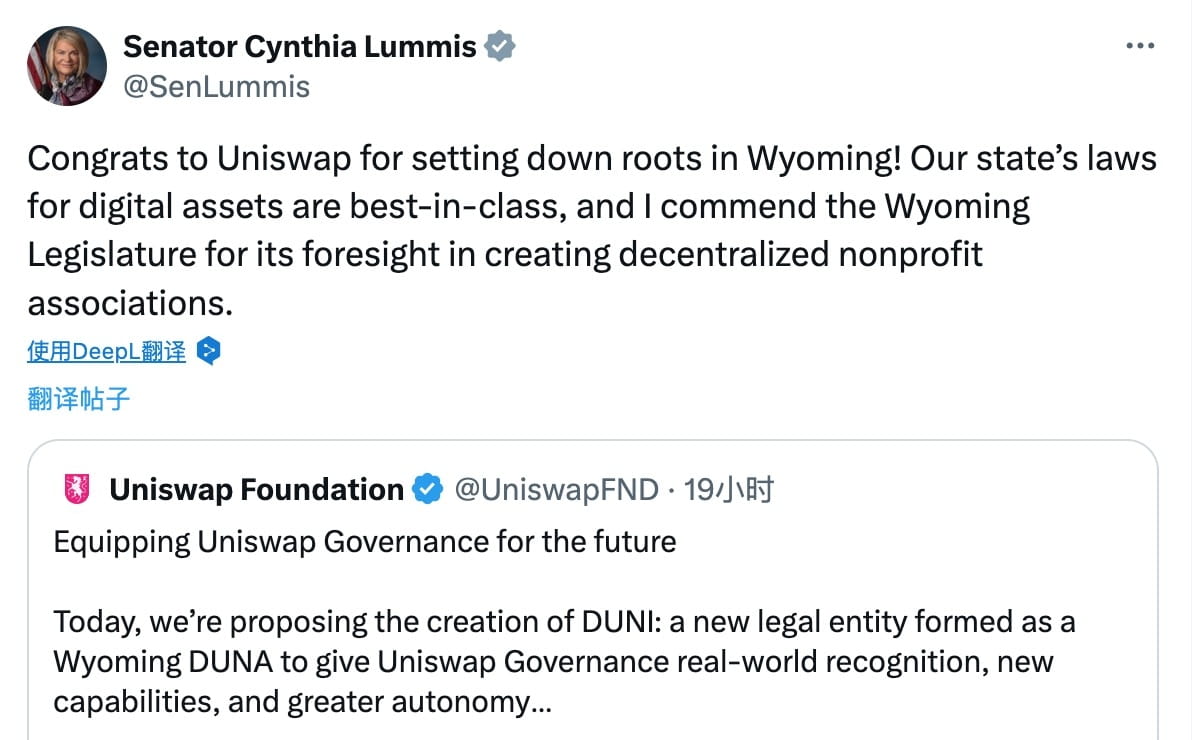Written by: Yangz, Techub News
In the current situation where the DeFi market is cooling down and funds are avoiding risks and turning to stablecoins and tokenized stock assets, Uniswap, as the industry leader, is planning to seek a way out for itself through a "big game" of compliance. Simply put, the protocol hopes to establish a legal entity "DUNI" according to the DUNA (Decentralized Unincorporated Non-profit Association) framework that took effect in Wyoming last year, thereby giving Uniswap governance real-world recognition, new capabilities, and greater autonomy. More importantly, this move may provide a legal basis for the "Fee Switch" proposal that has plagued its community for many years.
After the news was announced, UNI rose nearly 10%. At the same time, the community also began to discuss whether this carefully designed legal "armor" can help Uniswap survive this long DeFi winter? In addition, a deeper discussion is whether DUNA can truly promote DAO compliance into a new stage, given that the "DAO LLC" standard launched by Wyoming in 2021 ultimately failed to become mainstream due to regulatory conflicts and operational complexities?
Uniswap: DUNA framework's first pathfinder
Since Wyoming incorporated the DUNA framework into law in March of last year and officially took effect on July 1 of last year, this innovative legal architecture has not received much attention in the past year. After reviewing relevant records, only a few projects have shown interest in exploring, including the ai16z DAO and a16z talking at the end of last year to discuss launching DUNA; and last week Axie Infinity announced that it would establish a foundation and explore the DUNA architecture to establish a legal entity in the United States. In this atmosphere of watching, Uniswap took the first substantive step and became the first pathfinder to put the DUNA framework into practice. According to the DUNA framework, the entity that Uniswap plans to establish will give it three key capabilities: first, it will make on-chain governance decisions legally recognized, allowing it to sign contracts, own assets, sue and be sued, and pay taxes like other legal entities; second, it will protect UNI holders from personal liability for collective decisions through a clear liability isolation mechanism; and most importantly, this legal shell will not change the existing governance structure, and the UNI token economic model and voting mechanism will remain the same.
Specifically, the Uniswap Foundation's proposal includes three key protocol arrangements:
Association Agreement: Establishes the basic rules of DUNI, including defining the qualifications of participants, the rights and obligations of each member, and how to make and implement collective decisions, etc.
Executive Agent Agreement: Authorizes the Uniswap Foundation to handle administrative matters on behalf of DUNI without introducing centralized control or discretion. Specific examples include executing or submitting documents on behalf of DUNI according to governance instructions; appointing and coordinating third-party service providers approved by governance (such as lawyers, auditors, tax administrators, banks, etc.); transmitting governance-approved funds, payments or grants, etc.
Administrator Agreement: Delegates professional organization Cowrie (founded by David Kerr, who helped draft Wyoming's DUNA regulations) to perform duties expressly approved by Uniswap governance, such as being responsible for tax filing and other compliance work.
In terms of funding arrangements, the proposal requires the allocation of UNI worth $16.7 million from the treasury as a legal defense fund, mainly for dealing with potential regulatory challenges and clearing historical tax issues, while paying UNI worth $75,000 as compliance service fees. These funds will be managed through a trust structure to ensure that they are used for their intended purpose.
It is worth noting that this design deliberately maintains the decentralization of power. The Uniswap Foundation only acts as an "executive agent" to handle procedural matters, and Cowrie focuses on compliance operations, while all major decisions are still made by on-chain governance. This arrangement meets the compliance requirements of the real world and maintains the core concept of decentralization.
According to the established process, after community discussions this week, the proposal is expected to be snapshotted on August 18 or 25, and subsequent on-chain voting will be carried out on a date to be determined depending on the snapshot situation.
Can DUNA become Uniswap's "winter weapon"?
The introduction of the DUNA framework is regarded as an important attempt by Uniswap to break through the current predicament. And the core value of this proposal may be most directly reflected in the long-pending issue of the Fee Switch. According to The Block, Uniswap Foundation General Counsel Brian Nistler said in an interview that adopting DUNA will "pave the way" for activating the fee switch.
Currently, Uniswap Labs charges a fixed interface fee of 0.25% on some token pairs to support continued operations. As for transaction fees, Uniswap defaults to allocating them to liquidity providers (LPs). If the fee switch is turned on, the protocol can extract a portion of the fees to distribute to UNI holders or the protocol treasury.
Taking the past 30 days as an example (DefiLlama data shows protocol fees of approximately $126 million), even if the fee is extracted at a lower rate, the size of this fund is not a small amount. It can undoubtedly support protocol development, serve as a compliance reserve, or provide community incentives, becoming a key resource for Uniswap to withstand the current DeFi winter. However, due to legal risks and other considerations, community proposals regarding the fee switch have been shelved for a long time.

Last year, the foundation tried to propose a proposal to start the fee switch again, but unexpectedly withdrew it at the last moment. The official explanation was that an anonymous stakeholder raised a "new issue." According to Paradigm partner Dan Robinson, this decision stemmed from the pressure of an unnamed VC. Although Robinson did not explicitly name the VC, all clues pointed to a16z, and some people jokingly suggested that Uniswap be renamed "a16z-Swap." The top venture capital firm praised DUNA as an "oasis for DAOs" when it launched the DUNA framework in Wyoming. Miles Jennings, general counsel of a16z Crypto, wrote in the article: "DAOs that fail to use legal entities as organizational structures will be deprived of legal existence, unable to pay taxes, and face potential liability."

Fortunately, after a year of dormancy and preparation, Uniswap DAO Accountability Committee member Abdullah Umar wrote in summarizing the contents of the first Foundation Feedback Group (FFG) meeting that the foundation plans to coordinate the DUNA architecture with the fee conversion plan. And this strategic arrangement also shows that the decision to postpone the vote before may have been unavoidable. Now, if the DUNI entity is finally established, the legal certainty it brings is expected to clear the main compliance obstacles for Uniswap's fee switch.
From DAO LLC to DUNA: DAO Compliance Process Led by Wyoming
If the Uniswap Foundation's proposal to adopt the DUNA framework is an important practice in the DAO compliance process, then the key role of Wyoming in this historic transformation must also be mentioned. From DAO LLC to DUNA, Wyoming has made great contributions to promoting the DAO compliance process, and this leading position is not accidental, but stems from its profound legal innovation gene. As early as 1977, the state took the lead in passing the first (Limited Liability Company Act) (LLC Act) in the United States, providing small and medium-sized enterprises with a business entity form that combines flexibility and liability limitation. In addition, Wyoming was the first state to adopt the "Unincorporated Non-profit Association" (UNA) system. These pioneering measures not only influenced the legislation of various states in the United States, but also laid the foundation for the state's later exploration in the fields of digital assets and decentralized organizations.
In 2021, the year before what was hailed as the "Year of DAO," Wyoming demonstrated legislative foresight by formally passing the (DAO Supplement Act) (Wyoming DAO Supplement), becoming the first jurisdiction in the world to provide a clear legal framework for DAOs. This innovative legislation allows DAOs to register and operate in a special form of limited liability company (DAO LLC), and its core breakthrough lies in: on the one hand, providing members with limited liability protection, so that personal assets are protected from organizational debts; on the other hand, recognizing the legal validity of smart contracts and token voting, retaining the decentralized governance characteristics of DAOs.
This innovative model quickly attracted the practical implementation of projects such as CityDAO. However, data shows that DAO LLC has not triggered a large-scale registration wave. In addition, according to the Wyoming Secretary of State's Q4 2023 report, only 11 (23.4%) of the 47 DAO LLC entities registered in the state remain in good standing.
In the following years, with the market turning bearish and the weakening of the DAO narrative, the relevant compliance progress stagnated. It was not until March 7, 2024, when Wyoming Governor Mark Gordon signed the (DUNA Act), that the story of DAO compliance was continued again.
Compared with the previous relatively simple DAO LLC, DUNA demonstrates a more mature and complete legal framework design. It establishes DUNA's status as an independent legal entity, enabling it to participate in litigation, hold assets and bear legal responsibility in its own name, while achieving true decentralized governance through distributed ledger technology; similar to DAO LLC, the DUNA Act also constructs a liability isolation mechanism, but goes a step further, both ensuring that members do not bear joint and several liability for organizational actions, and allowing the organization to provide compensation to members performing their duties; in terms of organizational operation, DUNA innovatively sets the standard of "default perpetual existence + minimum membership size of 100", which ensures organizational stability and maintains decentralized characteristics. What is particularly groundbreaking is that the law allows DUNA to engage in for-profit activities and use the proceeds for non-profit purposes, while strictly limiting profit distribution, balancing the operational needs of DAOs with non-profit attributes. In addition, DUNA also enjoys the right to transform its organizational form and can be changed to traditional forms such as companies or partnerships according to development needs.
Now, with the Uniswap Foundation's proposal to adopt the DUNA architecture to establish a legal entity, this innovative DAO compliance framework has taken a key first step in practical application. However, it is still unknown whether the DUNA framework can truly lead DAO compliance into a new stage in the future.
Considering the current favorable background of continuous improvement in the US cryptocurrency policy environment, combined with Wyoming's consistent leading edge in digital asset legislation, perhaps DUNA does have the potential to become an important milestone in the DAO compliance process. As Senator Cynthia Lummis emphasized, Wyoming does have "foresight" in building a decentralized non-profit association system.

Summary
The Uniswap Foundation's attempt to propose the adoption of the DUNA framework marks that the DAO compliance process has once again embarked on a substantial exploration stage. This move is not only related to the subsequent development of the Uniswap single project, but also may provide a model for the entire DAO track and other DeFi protocols to balance compliance and decentralization.
Of course, this compliance process still needs to overcome many challenges: first, the uncertainty of the regulatory environment. Although the current US crypto regulatory policy shows signs of easing, the attitude of the US SEC and other agencies is still uncertain; second, the complexity of the practical level, including the implementation of the DUNA architecture, cross-border compliance, etc. need time to verify.
It is commendable that Wyoming's legislative innovation and Uniswap's practical courage both demonstrate foresight. At a crucial moment when the crypto industry is moving towards mainstream adoption, this pioneering spirit is particularly valuable. Perhaps, just like the early development of the Internet, the road to DAO compliance is destined to be uneven, but in the future, with the addition of more projects and the accumulation of practical experience, we have reason to expect a compliant and truly decentralized organizational form to finally take shape.


